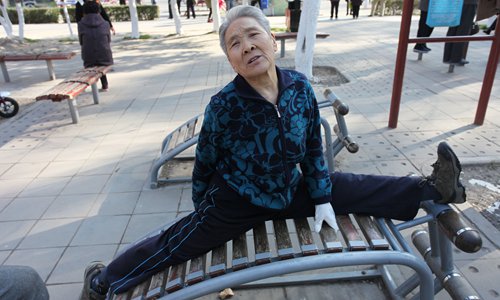"My mother was hospitalized because she'd overdosed on pseudo-ginseng even though she'd already been in hospital a couple of times before because of food poisoning due to ingredients contained in folk remedies she took," Wang Lele, a Xi'an-based doctoral student told the Global Times.

A senior in Xi'an, capital of Northwest China's Shaanxi Province does the splits in a park. (File photos: VCG)
Wang's mother, 60, suffers from high blood pressure, a common chronic disease in aged people. Influenced by the widespread idea that pharmaceutical medications have side effects, she persists in her belief that natural substances are more reliable.
"She'd take all this weird stuff she'd heard about to help her health, but even though she suffered because of it, it didn't stop her trying more folk remedies," said Wang.
There is a big belief in natural health remedies in China, particularly among seniors. But most of the remedies they try have no health benefits whatsoever, and some are harmful or even toxic.
In a recent extreme example, a woman surnamed Zeng, 51, was rushed to the emergency room by her husband on February 22 after she injected a concoction of 20 kinds of fruit directly into her bloodstream, according to Chinese news site thepaper.cn.
Zeng, a self-confessed health nut from Guiyang county in Chenzhou, Hunan Province, would try any folk remedy, as long as it claimed to be good for her health. She said that as eating fruit was good for you, she thought that infusing it directly into her body must be even better.
Zeng was in critical condition and at severe risk of organ failure and sepsis for five days. Most likely, she would have died if her husband had not intervened in the nick of time.
"There are strict procedures for giving a drip," said Liu Jianxiong, who treated Zeng at the intensive care unit at the Affiliated Hospital of Xiangnan University. He warned against people taking the practice of medicine into their own hands and told people to have belief in scientific methods and not to trust folk remedies.
"Chinese seniors with cardiovascular diseases believe wrongly that drinking fruit and vegetable juice helps unblock veins and arteries," said Hui Hui, deputy director of the Vasculocardiology Department of Dalian Municipal Central Hospital, Northeast China's Liaoning Province.
Walking backwards
In activities that are less harmful to health, besides the mysterious folk remedies, seniors practice different kinds of activities in the belief that it will improve their health.
Go to any park in the mornings or evenings, and it will be full of seniors rubbing up against trees, walking backward and lying on stone statues or paving stones.
This stone therapy is supposed to impart energy, and is seen as more effective than the traditional Chinese medicine practice of cupping. But medical experts say that rather than having a healing effect, it may cause hurt. In hot weather, people could get sunstroke, or muscle injuries which could lead to further complications.
Rubbing one's back against a tree trunk is supposed to stimulate acupressure points.
"To a certain extent, rubbing your back against a tree would help stimulate muscles and bones on the back, which boosts blood circulation and could mitigate pain through stimulating the channels on the back," said Gu Lei, a physiotherapist from Beijing's Xiaotangshan Hospital. However, Gu said that not all seniors should attempt this "tree therapy." Many seniors suffer from chronic conditions such as osteoporosis and muscular atrophy, so they may damage their bones, muscles and even organs.
He suggested that jogging, fast walking and taijiquan are more suitable activities.
Vinegar drinking
Some seniors believe drinking vinegar helps soften veins. Hui said this is ridiculous, as ingesting too much acidic liquid will stimulate gastric acid, causing indigestion and chronic stomach problems.
Hui told the Global Times that while the older generations desire to stay healthy for as long as possible, they cannot rid themselves of the erroneous belief that prescription drugs have damaging side effects, so they turn to these folk remedies instead.
They tend to follow the herd and believe in whatever the latest "effective method" that is passed around by their friends and peers. They lack trust in modern medicine, but they need to be persuaded to abandon this conviction, Hui said.
A report in the Yantai Daily called for more efforts from health authorities to provide better guidance on appropriate methods of ensuring health and well-being in later life. "Spreading awareness of science-based medication requires patience and care. Doctors and healthcare workers should teach seniors what to do to help them remain healthy into old age," said the report.


